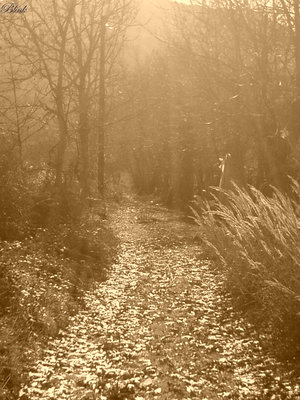|
  Day
24 Connotation Day
24 Connotation
You know that poem about two roads diverging
in a woods? Of course, you do, and you know it’s not just about
a road, right? The connotations of that road lead most readers
on to consider their own life journey, not just a travel itinerary.
That’s connotation.
In addition to literal, dictionary meanings,
words often have implied, emotional meanings known as connotations.
These connotations play a significant role in the search for
the “right word” because they sometimes clash with
a writer's intended meaning or view. Much of poetry involves
the poet using connotative diction that suggests shades
of meanings beyond “what the words simply say.”
Connotation is the extra tinge or taint
of meaning each word carries beyond the minimal, strict definition
found in a dictionary. For instance, the terms civil war,
revolution and rebellion have the same denotation;
they all refer to an attempt at social or political change. However,
civil war carries historical connotations for Americans
beyond that of revolution or rebellion. Likewise,
revolution is often applied more generally to scientific
or theoretical changes, and it does not necessarily connote violence.
Rebellion, for many English speakers connotes an improper
uprising against a legitimate authority (thus we speak about
"rebellious teenagers" rather than “revolutionary
teenagers”).
In the same way, the words house
and home both refer to a domicile, but home connotes
certain singular emotional qualities and personal possession
in a way that house doesn’t. I might own four houses
I rent to others, but I might call none of these my home,
for example. Contrast with denotation.(Notes from Dr. K. Wheeler's website.)
|
Favorable |
Neutral |
Unfavorable |
| relaxed |
inactive |
lazy |
| prudent |
timid |
cowardly |
| modest |
shy |
mousy |
| time-tested |
old |
out-of-date |
| dignified |
reserved |
stiff-necked |
| persevering |
persistent |
stubborn |
| up-to-date |
new |
newfangled |
| thrifty |
conservative |
miserly |
| self-confident |
proud |
conceited |
| inquisitive |
curious |
nosy |
|
|
Each of the following
sentences includes a pair of words with similar dictionary definitions
but different connotations. One of the words is more appropriate
based on the context of the sentence.
- As snakes continue to
grow, they (junk, shed) the protective keratinous layer
on the surface of their bodies because it does not expand.
- Oblivious to those around
him, the father tenderly (smiled, smirked) at his newborn
baby through the window of the hospital nursery.
- During rush hour traffic
in a metropolis, cars creep along at agonizingly slow (velocities,
speeds).
- Even the coolest star
in the night skies is unbelievably (sultry, hot) according
to astronomers.
- The local newspaper’s
front-page story indicated that $50,000 was (stolen, pilfered)
from the town’s largest bank during the night.
- The pack of wild horses
(loped, sprinted) alongside the train at top speed for
more than 200 yards.
- Although many Americans
purchase meat at their local grocery stores, some farmers still
(butcher, execute) livestock to feed their families.
- The French are (noted,
notorious) for their fine food.
|
Explore the free lesson plan on connotation and denotation (from Prestwick House). Have some fun with all the possibilities for chicken and cars!
Now read the following poem, mind fully
open to the possible connotations of even the simplest words
chosen --
|
S
5
10
15
|
Traveling Through the Dark by William Stafford
Traveling through the dark I found a deer
dead on the edge of the Wilson River road.
It is usually best to roll them into the canyon:
that road is narrow; to swerve might make more dead.
By glow of the tail-light I stumbled back
of the car
and stood by the heap, a doe, a recent killing;
she had stiffened already, almost cold.
I dragged her off; she was large in the belly.
My fingers touching her side brought me
the reason—
her side was warm; her fawn lay there waiting,
alive, still, never to be born.
Beside that mountain road I hesitated.
The car aimed ahead its lowering parking
lights;
under the hood purred the steady engine.
I stood in the glare of the warm exhaust turning red;
around our group I could hear the wilderness listen.
I thought hard for us all—my only swerving—
then pushed her over the edge into the river.
|
|
| |
|
|
| |
Questions on "Traveling Through
the Dark"
- Explain the speaker’s dilemma described
in this poem. What are the negative aspects of either choice?
- What choice does the traveler make? Why?
- What does the poem’s title imply about
our ability to make certain decisions?
- Think very carefully and explore the exact
word choice of the poet. Why a doe? a fawn? almost cold? What
implications can you find in the connotations associated with
the dark, the lights, the glare, the wilderness -- with swerving?
- What is the theme of this poem? Consider
the last line and the title carefully before answering.
|
|
| |
|
|
| |
For greater insight, check out critical discussion of
this poem. |
|
Your Turn: This
poem presents an epiphany. In a quick flash of recognition,
the speaker sees something which is simple and commonplace in
a new light. This sudden insight is almost religious, or metaphysical,
and reveals a universal truth. Discuss an epiphany of your own.
Listen to Stafford read this
poem.
|
